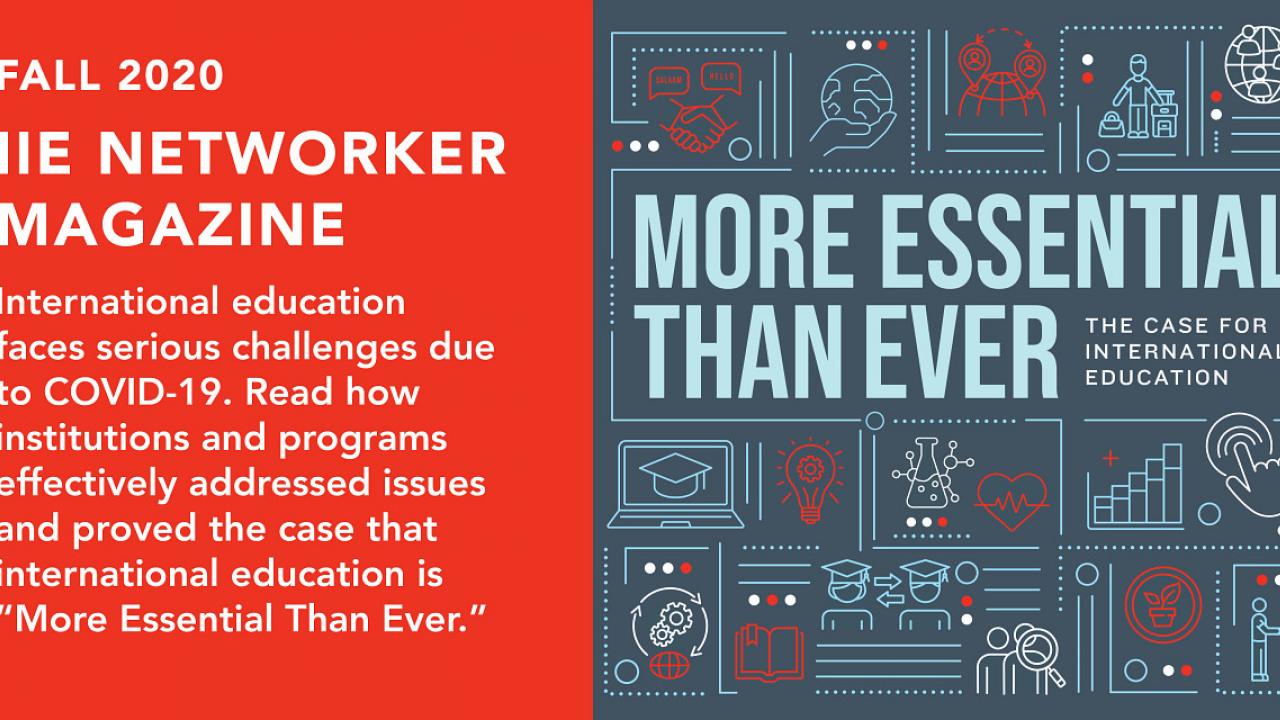
Global Education in Dynamic Environments: Strategies during the Pandemic and Beyond
By Joanna Regulska, Vice Provost and Dean, Global Affairs, and Bonnie Shea, Director of Communications, Global Affairs, University of California, Davis
In the field of global education, change is inevitable. The COVID-19 pandemic reminds us how interconnected the world is, how global challenges manifest themselves locally and across borders, and how crises exacerbate other challenges such as poverty, inequalities, climate change, political tensions, and educational needs. The multiplicity of challenges reinforces the critical need for students to develop global awareness, skills, knowledge, and sensibilities – all of which make global education more important than ever. It also fortifies the need for greater trust in partnerships to advance education and discovery. During crises, and beyond, we have a responsibility not only to rethink our strategies, approaches, and collaborations to meet the short- and long-term needs of our university missions, but also to recommit to global engagement.
Strengthening Partnerships for New Opportunities
Global challenges, even if manifesting at local levels, require global partnerships and problem solving. Partnerships on campus and around the world mitigate stressors as we share resources and provide value for common goals across borders. As a part of the Universitas 21 network, University of California (UC), Davis received funding to partner with Tecnológico de Monterrey (Mexico) and Shanghai Jiao Tong University (SJTU, China) on a global classroom project aiming to create a framework for teaching the United Nations Sustainable Development Goals (SDGs). Using a model developed and utilized by Tecnológico de Monterrey and to be enhanced by UC Davis and SJTU, several courses with virtual, hybrid, and in-person collaboration will be piloted, and a digital toolkit will be created. This is one example of how partnerships bring together diverse expertise, best practices, and experiences to support global learning missions. Throughout all of this, we need to make a conscious effort to connect and hear voices and perspectives from across the globe.
Adapting Programs to Meet New Campus Needs
The power of partnerships reminds us of the responsibility to prepare students for the challenges and opportunities ahead. At UC, Davis, we have a goal known as Global Education for All, aiming to provide 100 percent of students with global learning experiences, whether on campus, in the region, or across all seven continents. The pandemic has accelerated this goal to provide more accessible and flexible opportunities, especially those meeting diverse student needs. Technology enables these experiences even if travel is limited. In addition to global learning in courses, we are developing hybrid or online global learning and internship programs, leadership and professional development workshops, and projectbased opportunities to engage with the SDGs. Student surveys and focus groups confirmed: If travel is restricted, students want to learn new skills and gain practical knowledge to be ready for the global job market through these types of online opportunities.
Faculty also need new perspectives, frameworks, and tools to integrate global learning into courses. UC Davis Global Affairs runs a Curriculum Enhancement program for cohorts of faculty to make courses more global, and we’re already seeing results. For example, Design Professor Gozde Goncu-Berk is integrating online and international collaboration in her courses, connecting UC Davis students with Royal College of Art students to design wearable products (such as hospital gowns) while considering functional and cultural needs and to create an international textiles and health symposium. Students see global opportunities and are interested in translating these into future careers; for that to happen in the future, we have to prepare them now.
Leveraging Communications to Keep Connected
Especially in dynamic environments, we are committed to keeping our audiences well-informed and engaged, both internally and externally, through an intentional and comprehensive communications strategy. In a time of limited mobility and restricted gatherings, various forms of digital communications, consistent messaging, and inspiring storytelling build stronger and more connected global communities at a multiplicity of levels: within the global office, across campus and campus units, and with international campus community members and partners.
By using technology and communications strategies effectively, we can not only increase the visibility of opportunities and tell our global story but also stay connected with communities and partners around the world and engage in meaningful discussion and action. Through a unique online series in partnership with IIE, we’re bringing together leadership perspectives from global regions on the future of international education. Through a newly developed global conversations series in Global Affairs, we’re bringing together experts across fields for discussions on timely global topics. For example, the first online panel explored COVID-19’s impact on global agriculture, featuring faculty from multiple countries, industry experts, and one of our former UC Davis Mandela Washington Fellows, Shakira Phiri, who works in Malawi’s Ministry of Industry, Trade and Tourism.
Ultimately, this is the time to look for creative solutions that help us expand capabilities for mutually beneficial partnerships and ensure critical services for our campus continue. Now is not the time to close ourselves off; it’s the time to open ourselves up to the possibilities of the unknown future.